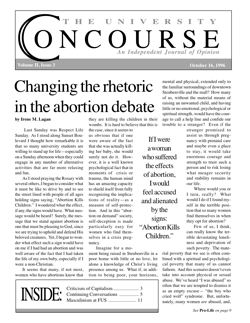When old ideas are breaking up
by Kathleen van Schaijik
Something in Judith Bratten’s letter in the Continuing Conversations section of this issue has made me think. She writes of her gratitude for being made “uncomfortable” by articles in the Concourse, and even, in a sense, for the tensions and divisions that have developed over the years in our communal life. She does not enjoy them, but she thinks they are healthy and fruitful.
Now that she has said it “out loud,” I see the truth of it much more clearly.
We are prone to conceptual complacency and intellectual stubbornness—gross traits in university men and women, but not easy to escape, since they so often go about cleverly disguised as “faithfulness to truth.” But if we look closely we can see the difference. Stubbornness will not listen to criticism, while genuine faithfulness always includes both a humble awareness that our human concepts rarely (if ever) do truth justice and a readiness to reject or adjust those concepts as deeper and broader experience of reality exposes their inadequacy.
This is not as easy as it may sound, because, in important matters, our concepts are not just concepts, but principles we live by. To adjust or reject these entails a certain dying-to-self. Especially if we have in any way invested ourselves in an idea—if we have made sacrifices for what we took to be the truth of a matter—it is very unpleasant indeed to find it publicly challenged by people not easily dismissed as enemies of truth.
If (for instance) I have been trying to serve the Church by writing and lecturing about the break-down of the family and the need for mothers to be at home full-time with their children, it might annoy but it would not surprise or upset me to find Eleanor Schmeal writing articles in The New Republic accusing me of being out of step with the times. She is not on my side; she is one of the opponents. But if, having in a sense (and with good reason) staked my life and career on the idea that feminism has been an unmitigated disaster for the Church, I one day pick up a letter by the Holy Father, whom I revere, and find him saying that feminism has been a “substantially positive” development in history, that women have been unjustly prevented from developing themselves fully, and calling on them—not to content themselves with homemaking—but to become more involved with all aspects of society,1 what then? I am suddenly faced with a very deep struggle. Something I cherish has to go—even if it is only my long-standing self-assurance.
My point is not to settle the question of the value of feminism, but to highlight a phenomenon that seems to be happening all around us in the Church today. Conceptual frameworks that have served us well for decades seem to be crumbling. (I do not speak of the mysteries of the Faith, which are the same “yesterday, today and forever.”) Things are no longer so simple as liberals vs. conservatives, communists vs. capitalists, feminists vs. traditionalists, bad guy against good guys. Black and white are blending confusingly. It is no longer so easy to say who is on whose side, or what makes each side what it is.
It is extremely uncomfortable. No wonder we are apt to be tense and querulous with one another. No wonder we are tempted to become recalcitrant—to prefer the old clarity and simplicity to the new depth and richness which threaten it.
But, on the whole, I think we have reason to be glad about what is happening. With Mrs. Bratten, I think the breakup of the old (painful as it naturally is) signifies that something bigger and better is coming. “The glory of this present house will surpass the glory of the former, says the Lord Almighty. And in this place I will grant peace.” (Haggai 2:9) Let us begin building, and not be caught clinging and lamenting over the rubble of what has gone before.
Kathleen van Schaijik
- See John Paul II’s ‘Letter to Women,’ issued June 29, 1995”> ↑


